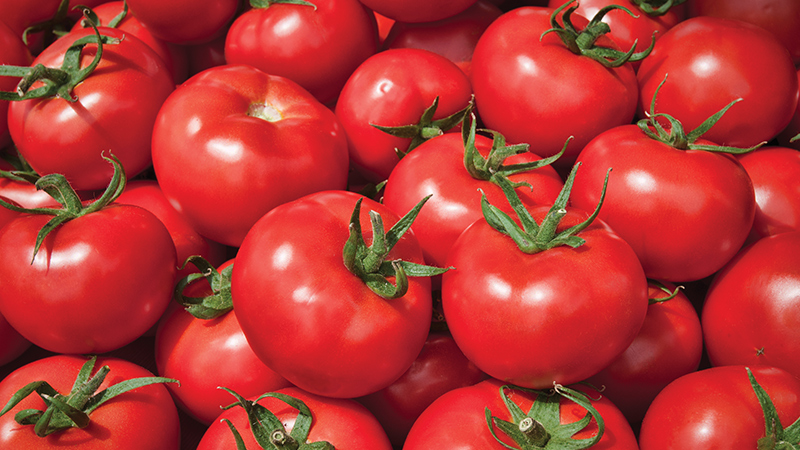Processing Tomato Market Uncertain For 2009
By Christine Souza
Despite back-to-back successes during 2007 and 2008, many of California’s processing tomato growers approach this year’s crop with some apprehension. The multi-year drought and the country’s dismal economic environment have farmers reassessing their planting plans.
For example, farmer Mark Borba of Riverdale said he plans sharp reductions in his tomato and row-crop plantings because of water shortages in the western San Joaquin Valley.
“I’ve had to cut back my plantings. Seventeen-hundred acres of tomatoes won’t be produced; 1,500 acres of the other diverse, mixed crops will lay fallow,” Borba said at last week’s California Irrigation Institute conference.
As a Fresno County farmer, Borba is in the state’s top processing tomato-growing region. A reduction in water would likely impact plantings in that area, but could also mean an increase in plantings in other growing regions that have a more-secure water supply.
Farmers like Borba, who are part of the Westlands Water District in Fresno and Kings counties, learned recently that they should expect a 0% water allocation for the season. Westlands water comes from the Central Valley Project, a federal project that may yield little water this year due to below-average snowfall and court rulings that restrict water movement through the Sacramento-San Joaquin Delta.
“Growers are just very concerned about their water supply. We have growers up and down the state who are in varying degrees of fallow lands,” said California Tomato Growers Association President and CEO Mike Montna. “Growers are faced with the unknown risk of, ‘Will I be able to bring this crop to fruition with the water that is allocated to me?’ There’s enough risk in farming without adding this huge water question.”
California tomato processors indicated in a January California Processing Tomato Report that they intend to contract 13.3 million tons, 15% more processing tomatoes than the 2008 contracted production reported last August. The report also indicates that processors estimate the contracted production for 2009 will come from 308,000 acres, producing an average of 43.18 tons per acre. The contracted acreage forecast is 31,000 acres more than was reported under contract in the August 2008 report.
“Processors have expressed their desire to contract 13.3 million tons. With the current water situation, it seems that this type of increase would be difficult to achieve, but not impossible,” Montna said. “With regard to excess inventory, it is our desire that the industry would only purchase amounts that it believes it can sell profitably in today’s current economy and marketplace.
While growers and processors continue to negotiate this season’s contracts for tomatoes that are grown for products like ketchup, tomato sauces and tomato paste, the uncertainty about water ripples through the entire tomato business, including greenhouses that provide tomato transplants that farmers will plant in fields this season. Jonathan Guido, greenhouse and farm supervisor at Pacific Triple E Produce in Stockton, said he wonders if he is going to get hit with orders all at once.
“In the greenhouse we just started seeding processing tomatoes for early spring planting and usually we have about 2-3 million plants by the first of February,” Guido said. “The uncertainty with the water supply, and therefore the planting schedule, means it is just a big waiting game at the moment.”
Pacific Triple E Produce grows about 33 million transplants in its greenhouses each year, with about one third of those being processing tomatoes grown for growers in San Joaquin County, Guido said.
Andy Pon, greenhouse manager for Westside Transplants, which has facilities in Firebaugh, Huron and Woodland, said orders for processing tomato transplants are coming in, but that growers are constantly re-evaluating their water supplies, both surface water and well water.
“We are trying to provide the same amount of plants and part of that depends on what the canneries are going to do. If they can’t get the acres down south because there is not enough water, they are going to do everything to go up north, where there is more water,” Pon said. “I’m just a cog in the wheel. I might lose early volume from down south, but I might make it up in May volume later, up north.”
Westside Transplants expects to grow about 200 million processing tomato transplants.
Fresno County farmer and food processor Stuart Woolf said he plans to contract for about 10% fewer acres because he doesn’t want to be stuck with any high-priced inventory.
“Those that have water will make vastly more money with a tomato contract at the prices being quoted than any other row crop commodity. Although the acres in California for all commodities are going to be limited because of the water issue, I don’t think there is going to be much of an impact to the tomato growers,” Woolf said. “Growers will err on the side of protecting the crop that will generate the most income and they believe that to be tomatoes right now.”
During the 2007 and 2008 seasons, the processing tomato sector produced large harvests with increased yields. That, coupled with a reduction in worldwide production and a weak U.S. dollar, resulted in increased exports of California tomato products. At the California Tomato Growers Association’s 62nd annual meeting in Modesto last month, Montna said both growers and processors face an uncertain global economy.
“Banks are beginning to ask growers more questions about their business than ever before and there is concern on how well the export business will perform in the future, and what fluctuations we will see on input costs this year,” he said. “Some of these factors have contributed to the delay in getting processors to respond to CTGA’s opening price offer. While we continue to make every effort to get the 2009 price agreement, it needs to be the right price for the risk that the growers are taking to produce a crop.”
(Christine Souza is an assistant editor of Ag Alert. She may be contacted at [email protected].)
Source: California Farm Bureau Federation










